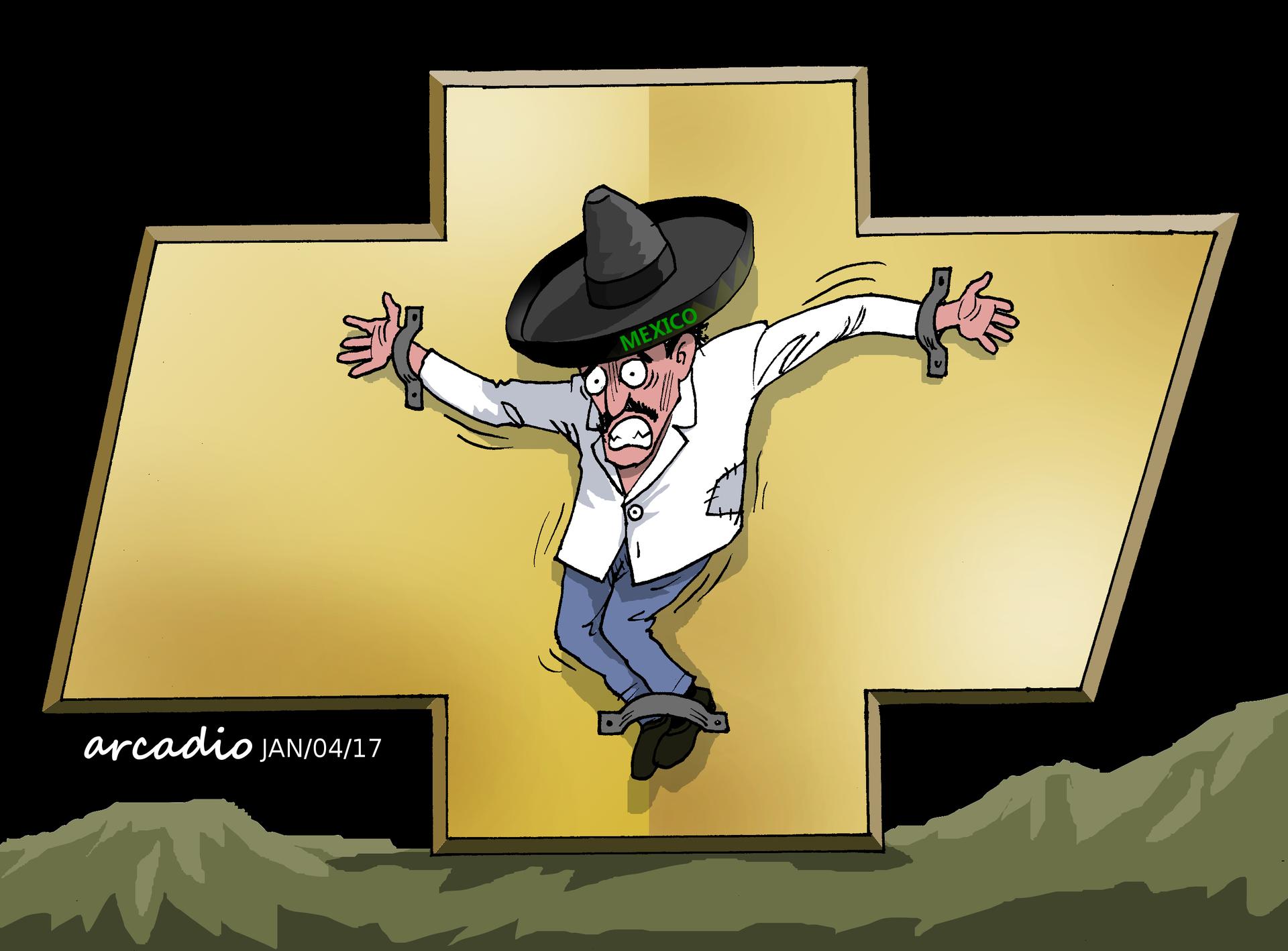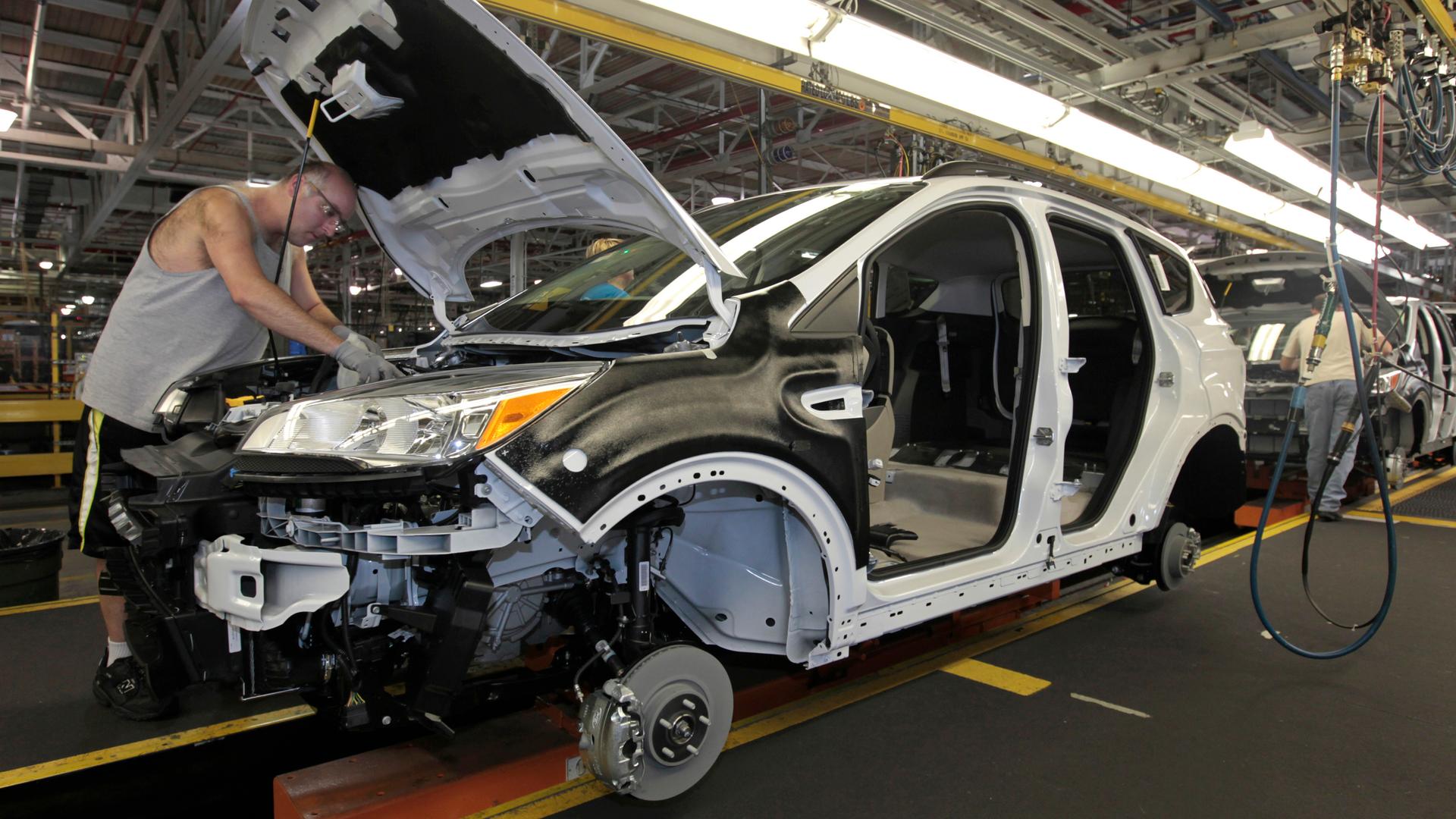American workers assemble a Ford Escape on the production line in Louisville, Kentucky.
We’re two weeks out from Donald Trump's inauguration, but already the president-elect is having an impact on the US economy. Exhibit A: He's been going after automakers, threatening to impose higher taxes if they build cars in Mexico for the US market.
And his strategy — threat by tweet — may be working. Earlier this week, Ford scrapped its plans to build a new $1.6 billion plant south of the border. Instead, the company says it will build its Ford Focus at an existing plant in Hermosillo, Mexico. Ford concurrently said it will be investing $700 million, and adding 700 jobs, in a new plant in Flat Rock, Michigan to build electric, hybrid, and autonomous vehicles.
Speaking on CNBC, Ford’s CEO Mark Fields said the move to scrap the plant in Mexico was all about business — lower demand for small cars in the US.
Trump and his supporters, of course, see things differently. They're crediting Trump's policies for Ford's change of heart.
Nobody can say for certain if Trump got to Ford, but consider this: Ford spent $2.7 billion on advertising in 2015. Translation: The company cares deeply about its image. And making Trump’s blitzkrieg of negative PR go away? That’s worth a lot to the company.
But wait a second. Ford still has massive operations in the United States: 80 percent of its vehicles sold in the country are actually built in the United States. So how fair is Trump being to Ford here?
And, consider what goes into a Mexican-built Ford: that car is loaded up with parts from Ohio, Indiana, Michigan, and elsewhere in the United States (not to mention parts from Canada, Europe and Asia).
The idea of an “American-made” car today is a quaint throwback to the 1950s and '60s. The next time you buy a car, any brand, look at the sticker and the percent of parts made in different parts of the world. Vehicles are globally built efforts.
Trump hasn’t only gone after Ford on Twitter — this week he attacked General Motors and Toyota.
A quick fact-check of Trump’s tweet. First, Toyota plans to build its new plant in the state of Guanajuato, Mexico, not Baja California. Second, production of Corollas would be shifting from Canada to Mexico, not from the United States.
As a presidential candidate, Trump also said he’d impose a 35-percent tax on goods coming in from Mexico. So could Trump do it? What would that look like?
Let’s say you’re an American who wants to buy a Ford Focus that’s going to be built in Mexico. For simplicity, let’s say that vehicle costs $20,000, not far from the actual cost. With Trump’s new “border tax,” that car from Mexico would now cost you $27,000.
If you’re in the market for a small car that’s similarly priced — say a Volkswagen Golf or a Mazda 3 — are you really going to spend an extra $7,000 on a Ford? I’m not.
Trump’s thinking is that a tariff would force automakers like Ford to build more cars in the United States again. But labor costs are much higher in the States than in Mexico, so the price of that Michigan-built Ford Focus would have to go up. With small vehicles the margins are thinner, so keeping down the price would be tough to do. Also, Ford has already sunk billions of dollars into its operations in Mexico, so it can’t really just walk away from its investments. (Never mind its Mexican workers on the other side of the border.)
Add it all up, and it doesn’t make sense for Ford to relocate its operations from Mexico back to the United States.
And Mexico would certainly retaliate against a US tariff and do the same thing to American products coming into Mexico. Then suddenly you have a trade war. It seems that economists are in near-universal agreement: a border tax would be economic folly, wreaking havoc on the US economy (and perhaps global economy) not seen since the Great Depression.
And then there are the nuts and bolts: NAFTA. Since 1994, the North American Free Trade Agreement has allowed the free passage of goods between Canada, Mexico, and the United States. A president would need congressional approval to undo that. Republican party leaders Mitch McConnell and Paul Ryan are both proponents of more free trade.
Now, a president technically could simply withdraw from a treaty, without Congress, but it’s never happened and would certainly be challenged in the courts.
All of these impediments make Trump’s threats toward automakers sound somewhat hollow, more like a PR stunt rather than an actual economic policy. But, if automakers change their tune and start building more vehicles in the United States and less in Mexico, who’s to say Trump’s threats didn’t play a role?

Every day, reporters and producers at The World are hard at work bringing you human-centered news from across the globe. But we can’t do it without you. We need your support to ensure we can continue this work for another year.
Make a gift today, and you’ll help us unlock a matching gift of $67,000!
